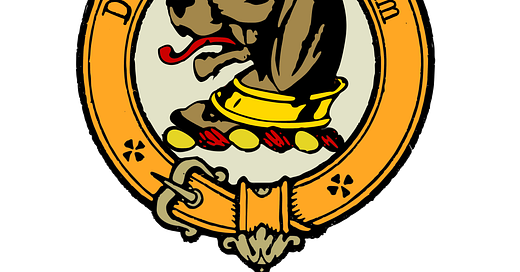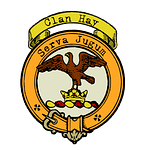Welcome back to "A Clan A Day Podcast," brought to you by bagtownclans.com. I'm your host, Colin MacDonald. Today, we’re diving into the rich history of Clan Melville, a Lowland Scottish family whose roots trace back to Normandy. From their early prominence as justiciaries and statesmen to their contributions to the Scottish Reformation and culture, the Melvilles have left an indelible mark on the fabric of Scotland.
The Melvilles take their name from the Barony of Malleville in the Pays de Caux region of Normandy. Guillaume de Malleville accompanied William the Conqueror at the Battle of Hastings in 1066, and his descendants eventually migrated to Scotland. During the reign of King David I, they were granted lands in Midlothian, which they renamed Melville. Galfridus de Melville was the first prominent family member in Scotland. He lived during the reigns of Malcolm IV and William the Lion and served as the first Justiciary of Scotland, marking the Melvilles as a key political family in the 12th century.
Sir John Melville of Raith in Fife, a later descendant, carried forward the family’s influence during the 16th century. A loyal servant of James V and an early convert to Protestantism, Sir John was appointed Captain of Dunbar Castle in 1540. His life, however, ended tragically during the turbulent Reformation period. In 1548, he was accused of treasonable communication with the English and executed. Despite his untimely demise, Sir John’s legacy endured through his children, many of whom continued the family tradition of service to Scotland.
Sir Robert Melville, one of Sir John’s sons, became a prominent diplomat and advisor to Mary, Queen of Scots, and later James VI. His role in key historical moments, including Mary’s abdication, was pivotal. Sent to deliver the ring symbolizing her decision to give up the throne, Sir Robert also carried correspondence to her from Queen Elizabeth I—a promise of protection that never materialized. Remarkably, Sir Robert lived to the age of 94, earning the title Lord Melville of Monimail before his death in 1621.
The Melvilles’ power expanded further in the 17th century when George Melville, 4th Lord Melville, aligned himself with William of Orange during the Glorious Revolution. As a reward for his loyalty, George was created the 1st Earl of Melville in 1690. This period also saw the merging of the Melville and Leven titles through George’s marriage to Lady Catherine Leslie. Their son, David, inherited both titles, uniting the earldoms and further cementing the family’s status among Scotland’s nobility.
The Melvilles were not just political players; they were also cultural and religious reformers. Andrew Melville, a cousin of Sir John, was a towering figure in the Scottish Reformation. A staunch Presbyterian and academic, Andrew reshaped the educational landscape as a leader at both Glasgow and St Andrews Universities. His fierce advocacy for the independence of the Scottish Church brought him into conflict with James VI, leading to his imprisonment in the Tower of London and eventual exile in France.
Sir James Melville of Halhill, another notable member of the clan, left a lasting legacy through his writings. His memoirs, “Memoirs of His Own Time,” provide a vivid account of the political intrigues of the 16th century. Sir James’s daughter, Elizabeth Melville, became the first Scottish woman to publish poetry, with her spiritual work “Ane Godlie Dreame.” Her writing remains celebrated today, a testament to the intellectual and cultural contributions of the Melville family.
The Melville legacy also includes their ancestral seats, which tell their own stories of grandeur and resilience. Melville Castle in Midlothian, rebuilt in 1786, stands as a monument to their heritage. In Fife, Melville House, built in 1697, served as the residence of the 1st Earl of Melville. Other notable properties include Rossend Castle, which overlooks Burntisland Harbour, and Glenferness House in Nairn, the current home of the Earls of Leven and Melville.
Although Clan Melville is now armigerous, without an official chief, their influence remains a cornerstone of Scottish history. From their Norman origins to their contributions to politics, religion, and culture, the Melvilles exemplify a legacy of resilience and dedication. Today, their name is preserved by the Melville Clan Society, which continues to celebrate the achievements of this illustrious family.
Thank you for joining us on this exploration of Clan Melville. Be sure to tune in tomorrow for another chapter in the saga of Scotland’s clans. I'm Colin MacDonald, and as always, go n-éirí an bóthar leat—may the road rise to meet you.













Share this post